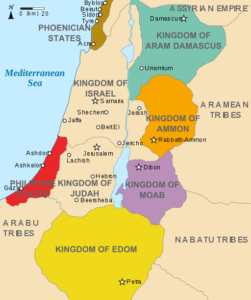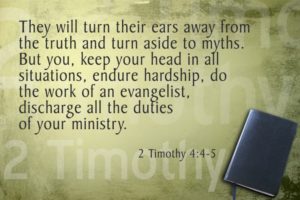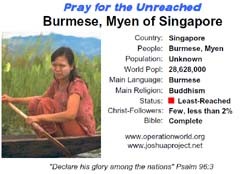TODAY’S READING FROM THE OLD TESTAMENT- JEREMIAH 48:1- 49:22
Jeremiah prophesies ‘woes’ to the Moabites, Ammonites and Edomites. ‘Woe’ is a Biblical term for announcing deep suffering from affliction, calamity, or ruinous trouble.
Like Jerusalem of Judah, the proud cities of Moab will be brought low with destruction by the Babylonians. “Her crying will be heard as far away as Zoar”, a city on the south east side of the Dead Sea, far from Moab’s mountains on the north east side. Moab will be judged for trusting in its wealth and skill and its idolatrous worship of the false deity, the pagan god, Chemosh, which involved child sacrifice. The vengeance brought about in Moab’s destruction was the work of the Lord (48:10). Moab was known for its vineyards and wine production. God finds it necessary to purify Moab with judgment in a way that is similar to purification of wine. The dregs of idolatry must be exposed. The impurities must be removed. Heavy chastisement requires that vessels must be poured out and destroyed (48:12).
Jeremiah 48:13 13 “And Moab will be ashamed of Chemosh, as the house of Israel was ashamed of Bethel, their confidence.
Moab once boasted of its heroes of wisdom and skill the way the natural man boasts in his strength and wisdom. Jesus warns: “The flesh profits nothing!” Its superficial glory is like grass. It withers, fades, and is easily crushed.
Moab has shown scorn to Israel. She rejoiced in Jerusalem’s destruction. Her disdain for the city of God did not go unnoticed. Now a similar calamity was coming her way. God would use Nebuchadnezzar, the destroyer, to judge Moab.
However, the Lord does not take delight in Jerusalem’s destruction, nor Moab’s.
Jeremiah 48:31 31 “Therefore I will wail for Moab, even for all Moab will I cry out; I will moan for the men of Kir-heres.
Once again, the oil of joy is replaced with mourning (48:33). Beauty with ashes.
Jeremiah 48:38 38 “On all the housetops of Moab and in its streets there is lamentation everywhere; for I have broken Moab like an undesirable vessel,” declares the LORD.
However God promises that in the latter days, the LORD will reestablish Moab and restore her fortunes (48:42).
Jeremiah 48:47a 47 “Yet I will restore the fortunes of Moab in the latter days,” declares the LORD.
Jeremiah prophesies against Ammon in Chapter 49. Once Jerusalem is destroyed, Ammonites (living east of the Jordan) come to take territory by occupying the city of the Jews. The territory once belonging to Gad is taken over by worshippers of Molech (Milcom), the god to whom child sacrifices were tragically offered in Judah (See Jeremiah 32:35; 2 Kings 23:10).
Rabbah is the capital of Ammon. The inhabitants are told of their imminent destruction. It will become a mound of ruins. In the future, Israelites will drive out those who drove them out (Jer 49:2).
Jeremiah prophesies against Edom (Jer 49:7-22). Edom was located south of Moab and the Dead Sea. Teman, a town in the north of Edom, was the hometown of Job’s friend, Eliphaz. Apparently, those from Edom, and Teman in particular, were known for their wisdom (49:7). ‘Esau’ (the name of the brother of the patriarch Jacob) was another name for Edom, because the Edomites were Esau’s descendants.
The Babylonians would strip Edom bare of all it once took pride in. Unlike the Moabites, who could hide in the caves of Petra, the Edomites would have no place to hide from its invaders.
However a word of mercy is given to the vulnerable:
Jeremiah 49:11 11 “Leave your orphans behind, I will keep them alive; And let your widows trust in Me.”
TODAY’S READING FROM THE NEW TESTAMENT – 2 TIMOTHY 4:1-22
These are the last written words from the Apostle Paul. We are right to give weight of emphasis to them. He charges Timothy, with the utmost solemnity, to be strong in the ministry of the Word:
2 Timothy 4:1-2 1 I solemnly charge you in the presence of God and of Christ Jesus, who is to judge the living and the dead, and by His appearing and His kingdom: 2 preach the word; be ready in season and out of season; reprove, rebuke, exhort, with great patience and instruction.
Paul makes it clear that our preaching should not be conditioned upon how we feel or how our hearers may respond. Our ministry is not to tickle people’s ears with ‘feel good’ messages. Preaching should challenge people. It afflicts the comfortable and comforts the afflicted!
Paul is living with the end in view. He knows not only that he will soon be executed by the Roman authorities, but that he will be appearing before his God and Savior who will examine his works.
Preaching is the primary tool of witness. Nothing can take its place in the ministry of the church. It is God’s chief means of edification, exhortation, instruction and equipping. It is essential to pastoral ministry.
Romans 10:14 14 How then will they call on Him in whom they have not believed? How will they believe in Him whom they have not heard? And how will they hear without a preacher?
Paul warns of a coming day that we are familiar with in the 21rst century.
2 Timothy 4:3-4 3 For the time will come when they will not endure sound doctrine; but wanting to have their ears tickled, they will accumulate for themselves teachers in accordance to their own desires, 4 and will turn away their ears from the truth and will turn aside to myths.
In addition to a steady flow of teaching, the entire church should be involved someway in the work of evangelism (4:5). It is not easy. We must endure hardship and keep our head in all situations.
Paul describes his death as a scheduled departure. For every scheduled departure, there is a scheduled arrival. As Paul pours his life out to the last drop in worshipful service to God, he has the ‘bema’ seat judgment and his future reward in view. He is mindful that it is all of grace and that his reward will be shared by all those who look forward to the return of Christ.
Paul’s final words disclose how his affections were bound to those with whom he had labored throughout the years. Some had brought him grief. Demas deserted Paul. He had been one of his co-workers (Colossians 4:14, Philemon 1:24). His motives were clear. He loved ‘this present age’. He was having an affair with the world system and living for its values- the lust of the eyes, the lust of the flesh and the pride of life (1 John 2:16).
Paul was feeling the physical absence of his friends, even though they were very much in his heart. Crescens had gone to Galatia, Titus to Dalmatia, and Tychicus to Ephesus. Only Luke, the physician who had accompanied him on his later missionary journeys, remained with him.
Remember John Mark? The relative of Barnabas had caused Paul such grief, on the first missionary journey, that Paul insisted that he not travel with them again. Since that time, Paul has had a change of heart. Now he sees John Mark as a vital asset to the church and a much-appreciated minister of the gospel and friend. (He would be the author of the third gospel, the Gospel of Mark).
He asks Timothy to come visit him before winter, when ships no longer sail the Mediterranean because of adverse weather. He hopes Timothy can bring his cloak, the scrolls and the parchments.
This letter gives us some hints as to how the readers should be praying for Paul. He has been persecuted. He is not afraid to name his attacker.
2 Timothy 4:14 14 Alexander the coppersmith did me much harm; the Lord will repay him according to his deeds.
Timothy should not be ignorant of this dangerous man who has been such a destructive influence on the church.
Paul describes his trial and his disappointment that no man stood with him in his defense. However he had some vision correction. He took courage in the fact that the Lord stood with him as His eternal defense.
2 Timothy 4:17-18 17 But the Lord stood with me and strengthened me, so that through me the proclamation might be fully accomplished, and that all the Gentiles might hear; and I was rescued out of the lion’s mouth. 18 The Lord will rescue me from every evil deed, and will bring me safely to His heavenly kingdom; to Him be the glory forever and ever. Amen.
Paul closes his letter with references to some familiar names of those whom we have met in previous readings in the New Testament. Paul asks Timothy to greet Priscilla and Aquila, a tent-making couple, whom Paul originally met in Corinth (Acts 18) and who also became important ministers in the church in Ephesus and Rome (Acts 18; Romans 16:3; 1 Corinthians 16:19). We met Onesiphorus in 2 Timothy 1:16. Trophimus was a friend of Tychicus, and a dear friend of the Apostle Paul (Acts 20:4). The fact that Paul left Trophimus at Miletus to recover from his illness, demonstrates that not all whom the apostles prayed for were miraculously and instantly healed. Trophimus was the Ephesian Gentile who got Paul into trouble. His presence in Jerusalem caused a riot people assumed that Paul was taking him into the temple and thereby defiling it (Acts 21:28-29).
TODAY’S READING FROM THE BOOK OF PSALMS – PSALM 95:1- 96:13
The reading from Psalms 95 and 96 call us to whole-hearted worship. We are called to worship the Lord with joyful thanksgiving. We are to sing, declare, and shout our praises. This is not a private, quiet affair. It is a call to corporate worship.
Together we are called to ascribe to the Lord the glory due His Name (96:7). We are to proclaim His mighty works of creation and redemption. We declare His glory among the nations and His marvelous deeds among all people-groups. This is public worship. “Say among the nations, “The Lord reigns!”
Notice how corporate worship engages all our being. Our bodies bow, stand, tremble and are set in a direction of drawing near with full attention given to His worthiness.
For the Lord is ‘The Great God’. All other gods are man-made idols, conjured up by the minds of those who suppress the true knowledge of God in unrighteousness (Romans 1:18).
The Psalmist recognizes that this great God who has made Himself known through His Word is the creator of heaven and earth and will judge the world with equity (96:11) and in righteousness (96:13).
Psalm 96:13 13 Before the LORD, for He is coming, for He is coming to judge the earth. He will judge the world in righteousness and the peoples in His faithfulness.
God clarifies His covenant relationship with His people, defining the terms.
“He is our god, and we are the people of His pasture, the flock under His care.”
Do you know your Shepherd? Do you belong to His flock? Have you been born of the Spirit and do you have His witness that you belong to the One who laid down His life for His flock? We all like sheep have gone astray and turned to our own way. But the Lord made our Shepherd the sacrificial Lamb to shed His blood to satisfy justice, acquit us of guilt and reconcile us to Himself. We must now respond to the Shepherd’s voice and come to Him with penitent faith.
The Psalmist pleads with people who hear the Word to respond to the Word with faith. His words are repeated in the Book of Hebrews, where the writer affirms that they are the words of the Holy Spirit.
Hebrews 3:7-11 7 Therefore, just as the Holy Spirit says, “TODAY IF YOU HEAR HIS VOICE, 8 DO NOT HARDEN YOUR HEARTS AS WHEN THEY PROVOKED ME, AS IN THE DAY OF TRIAL IN THE WILDERNESS, 9 WHERE YOUR FATHERS TRIED Me BY TESTING Me, AND SAW MY WORKS FOR FORTY YEARS. 10 “THEREFORE I WAS ANGRY WITH THIS GENERATION, AND SAID, ‘THEY ALWAYS GO ASTRAY IN THEIR HEART, AND THEY DID NOT KNOW MY WAYS’; 11 AS I SWORE IN MY WRATH, ‘THEY SHALL NOT ENTER MY REST.'”
The writer of Hebrews sums up the importance of believing the gospel.
Hebrews 3:12 Take care, brethren, that there not be in any one of you an evil, unbelieving heart that falls away from the living God.
TODAY’S READING FROM THE BOOK OF PROVERBS – PROVERBS 26:9-12
Proverbs 26:9-12 9 Like a thorn which falls into the hand of a drunkard, so is a proverb in the mouth of fools. 10 Like an archer who wounds everyone, so is he who hires a fool or who hires those who pass by. 11 Like a dog that returns to its vomit is a fool who repeats his folly. 12 Do you see a man wise in his own eyes? There is more hope for a fool than for him.
PRAY FOR THE NATIONS – SINGAPORE
Singapore
Republic of Singapore
Asia
Geography
Area: 699 sq km
One larger and 54 smaller islands off the southern tip of Peninsular Malaysia; strategically located for communications and trade. Singapore is Asia’s cleanest and greenest city.
Population: 4,836,691 Annual Growth: 2.54%
Capital: Singapore
Urbanites: 100%
HDI Rank: 23 of 182 (UN Human Development Reports 2009)
Peoples
Peoples: 51 (41% unreached) All peoples
Unreached Peoples Prayer Card
Official language: Mandarin (Chinese), English, Malay, Tamil Indian. English is the primary language for education Languages: 31
Religion
Largest Religion: Buddhist
| Religion | Pop % | Ann Gr | |
| Christians | 775,805 | 16.04 | 3.9 |
| Evangelicals | 377,398 | 7.8 | 3.2 |
| Buddhist | 1,949,186 | 40.30 |
Known as the cleanest and greenest city in Asia, Singapore is an island located just north of the equator in Southeast Asia and is one of the world’s most prosperous nations. Singapore was founded as a British trade colony in 1819 and was under British rule until 1959. Full independence as part of Malaysia came in 1963, but after a short couple of years of unification, Singapore separated from Malaysia in 1965 as a result of differences in political beliefs. Since then, Singapore has been led by the People’s Action Party which has dominated elections under a parliamentary government.
Singapore is known as one of Asia’s economic “tigers,” and its economy ranks second out of 41 countries in the Asian-Pacific region. Its large, free port is among the busiest in the world and contributes significantly to Singapore’s position as one of the greatest commercial centers in the world. Due to its booming economy, the nation is becoming increasingly materialistic, and many Singaporeans are preoccupied with pursuing the five C’s: career, cash, car, club, and condo. Family structures and relationships, traditionally strong, are suffering today because they are no longer a societal priority.
Singapore is a multi-religious society, with Buddhism (40 percent), Islam (13 percent), Hinduism (4 percent), and Christianity (16 percent) practiced. Religious tolerance and harmony are government priorities and resolute action is taken when these are threatened. The Church is growing, though Christians struggle to maintain their spiritual fervor in the highly materialistic, competitive, and achievement-oriented culture. Associated with these is an underlying sense of insecurity, which also affects the Church. Many Christians struggle to prioritize spiritual riches and development over worldly riches and personal achievement. Excessive competitiveness within society has also sub-consciously crept into the Church, weakening unity among congregations. The many achievements of the nation and the Church feed a sense of pride that at times seeks to withhold glory from God. Pray that Christians will have Spirit-led sensitivity and wisdom to present Singaporeans with a Christ-glorifying witness of vibrant and relevant faith in contemporary society.
Challenges for Prayer
Singaporean society is built on dedicated labor, discipline and self-reliance. These engender stability, good governance and a corruption-resistant culture, but also an emphasis on performance and wealth. Materialism has noticeably increased. Much of Singapore’s affluence is now dependent on imported labor from poorer countries; entire sectors of the nation’s economy would collapse without it. Pray for justice and fair treatment for all those from abroad; despite good legal safeguards, exploitation does exist. Pray that churches might become more active in assisting those at risk. Pray also that the admirable strengths of Singapore might not in themselves become idols.
The many Christian support ministries with national or international impact through involvement in:
- a) There are nearly 100 Christian bookstores and at least 10 publishers of books, magazines and tracts.
- b) FEBC and TWR have offices here, and a host of local Christian radio stations, including Internet radio, cater to diverse interests.
- c) Internet ministry abounds, with tech-savvy Christians creating evangelistic and discipleship tools. Most churches have well-developed websites for their members. The dark side of Singapore’s connectivity is a widespread Internet vice – addiction to online gaming is rapidly growing, even among Christians. Pray for the fruitful kingdom use of this particularly potent form of media.
PRAYER: You are the Great God, the Creator of heaven and earth, our Father and our King. There is none who compares with You. Your mercy has called us out of darkness into Your marvelous light by the power of the gospel. We praise You with our lips and by yielding our lives to do Your will through the enabling work of Your Spirit within us. Help us to be steadfast in our proclamation of Your Word and ministry to the saints and the lost. Show us our part in the work of evangelism. Give us wisdom as we seek to be good stewards of the gifts, talents, material and spiritual blessings that we have received. We ask You to open doors for the ministry of the body of Christ, and help us to make the most of every opportunity. In Jesus’ Name. Amen.
